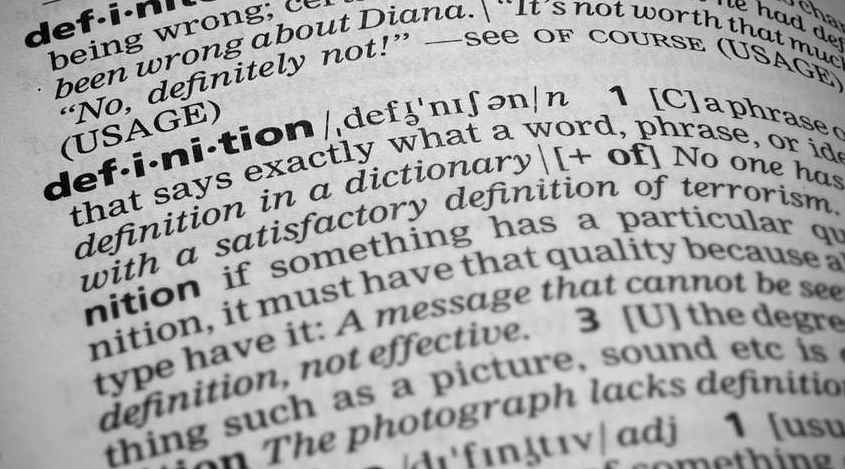






See listing of Recent and Most Popular articles on the Home Page
Connections
Category: Communication / Topics: Change • Communication • Language, Meaning • Popular Culture • Trends
25 Words That Don't Mean What They Used To
by Paul Anthony Jones / Miental FLoss
Posted: June 17, 2023
It's inevitable that words will change over time. In some instances, words gain new meanings entirely different from their original definition…
Editor;s Note: When we speak we usually assume the words and phrases we use are understood to have a certain meaning. But the meaning of language changes over time, as illustrated by Paul Anthony Jones' look at 25 words in a recent piece on Mental Floss. Here are the first ten. Follow the link at the bottom of the page to see the full article with all 25 words.
When the English clergyman Thomas Fuller used the word unfriended in a letter dating from 1659, we can be pretty sure he wasn’t talking about his Facebook page. Instead, Fuller used the word to mean something like “estranged” or “fallen out,” a straightforward literal meaning that has long since “fallen out” of the language.
It’s to be expected that the words we use will change and develop over time as they begin to be used in original and innovative new contexts. But in some instances, these developments can lead to words gaining new meanings entirely different from their original implications—and the 25 words listed here have done just that.
1. Alienate
Alienate, like alien, is derived from the Latin word alienus, which was used to describe anything that was unfamiliar, unconnected, or foreign. And when alienate first appeared in English as a legal term in the mid-1400s, it meant to transfer ownership of some property over to someone else, so that it is now “foreign” or “unconnected” to you. It’s from here that the modern meaning of “estrangement” or “distance” eventually developed.
2. Ambidextrous
Ambidextrous literally means “able to use both hands as well as you can use your right.” It certainly isn’t its earliest meaning, though: When it first began to be used in English in the mid-16th century, an ambidexter was someone who took bribes from both sides in a legal action, and as such ambidextrous originally meant “duplicitous” or “two-faced.”
3. Bunny
Bunny derives from bun—which was an old English word for a squirrel, not a rabbit.
4. Cheap
The use of cheap to mean “low-cost” is a relatively recent invention that dates back about 500 years. That might not sound all that recent, but compare that to the fact that the earliest record of the word cheap in any context dates from the 9th century, when it originally meant something along the lines of simply “trade” or “bargaining” or “marketplace.” Likewise, to cheapen something originally meant to ask how much it costs.
5. Dump
Nowadays when we say we’re “down in the dumps,” we mean that we’re in a gloomy, low-spirited mood. But the original dump from which this derives was actually an old Tudor English word for an absent-minded daydream, or a dazed, puzzled state of mind, not a depressive one. In that sense, it probably has its roots in an earlier old Dutch word, domp, meaning “haze” or “mist.”
6. Explode
The –plode of explode is derived from the same root as applaud—it originally meant “to jeer a performer off a stage.”
7. Fantastic
The link between fantastic things and absolute fantasy was once much closer than it is today. Fantastic originally meant “existing only in the imagination,” or in other words “unreal” or “based on fantasy.” Because fantastic things like these would be so extraordinary or bizarre, eventually the word became attached more loosely to weird and fanciful, and ultimately impressive or wonderful things.
8. Fascinated
The root of fascinated is the Latin word fascinus, which referred to a magic charm or spell. As such, its original meaning was “bewitched” or “enchanted,” not just “interested” or “enthralled.”
9. Gamut
Long before we started using do-re-mi, the first and lowest note of a musical scale was called ut. And the lowest of all the uts was gamma ut (named for the Greek letter gamma), which eventually simplified to gamut. As time went by, the term gamut came to refer collectively to all the notes of a musical scale, and then to the full range of a musical instrument, from where the modern sense of “the full extent” or “scope” of something eventually derived in the mid-1700s.
10. Girl
Bizarrely, the word girl was originally gender neutral and could be used in same way we would use child or kid. Its meaning didn’t begin to become more specific until the 15th century, after the word boy—which originally meant “a male servant or assistant”—was adopted into English (possibly from French) and effectively stole half of the meaning of girl, leaving us with the opposite pair we have today.
• Handicap • Husband • Jargon • Keen • Livid • Manage • Naughty • Nervous • Nice • Punk • Queen • Rival • Speechless • Thrill • Volatile
Paul Anthony Jones is a writer and musician from Newcastle upon Tyne. He is the author of word origins guide Haggard Hawks and Paltry Poltroons, and runs its tie-in Twitter account @HaggardHawks
Editor's Postscript: Jones' last word, "volatile," describes the impact of social movements on the meaning of certain words. This being Pride Month reminds us of the drastic shift in the application of the word "gay," from a state of light-hearted emotion (see how often it is used in that context in popular culture prior to World War II) to a designation for homosexuality. More complicated are changes in terms like "pride," "drag," and "queer." (For more on this see Jim Watkins article this week, "Gay Pride Prompts Sad, Shameful Animosity"—and he's not talking to just one side of the issue.)
Changes like these affect not only language, but fashions, colors, symbols, other forms of cultural meaning. I happen to like red t-shirts and my Republican roots have been seriously challenged by Trumpism, so wearing a red t-shirt in public has taken on a meaning of its own that make me think differently when looking in my closet. (I now consider myself independent or small-r republican). Words, colors, symbols once fairly neutral have taken on meanings that cause some to celebrate this new symbol of identity while others, often the majority, feel a sense of loss. So, watch your language!
Search all articles by Paul Anthony Jones
Posted: June 17, 2023 Accessed 511 times
![]() Go to the list of most recent Connections Articles
Go to the list of most recent Connections Articles
![]() Search Connections (You can expand the search to the entire site)
Search Connections (You can expand the search to the entire site)
![]() Go to the list of Most Recent and Most Popular Articles across the site (Home Page)
Go to the list of Most Recent and Most Popular Articles across the site (Home Page)
 Loading requested view...
Loading requested view...